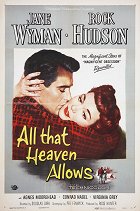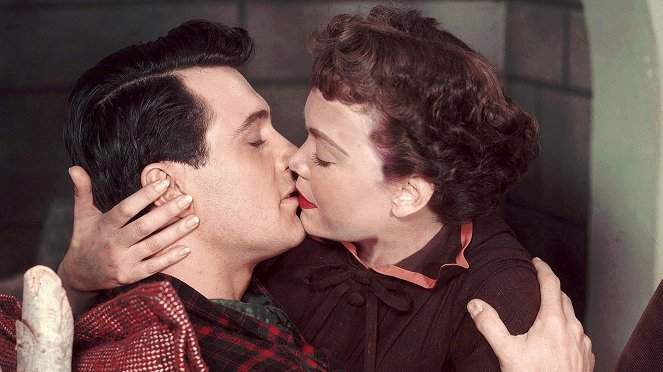Rendező:
Douglas SirkForgatókönyvíró:
Peg FenwickOperatőr:
Russell MettyZeneszerző:
Frank SkinnerSzereplők:
Jane Wyman, Rock Hudson, Agnes Moorehead, Conrad Nagel, Virginia Grey, Gloria Talbott, William Reynolds, Charles Drake, Hayden Rorke, Leigh Snowden (több)Tartalmak(1)
In ALL THAT HEAVEN ALLOWS, Douglas Sirk's haunting suburban morality play, Jane Wyman plays Cary Scott, a wealthy middle-aged widow in love with a younger man considered by those around her to be far below her social standing. Her torrid affair with Ron Kirby (Rock Hudson), a handsome, earthy gardener, quickly creates unbearable societal pressure for Cary. Giving in to the scathing criticism of her stodgy neighbors and her materialistic children, Cary severs contact with Ron. She then discovers--perhaps too late--that her heart cannot be so easily caged. (forgalmazó hivatalos szövege)
(több)Recenziók (2)
At first glance, a terribly simple storyline about how a woman and a man fall in love with each other, with the only problem being that each is from a slightly different social class. Especially in her case, it would be a problem if she got involved with him. However, she realizes, in very powerful scenes, that what she wants is not actually that selfish, at least compared to what others want, whom she wants to submit to. A beautiful movie.
()
On the surface, All That Heaven Allows is schmaltz coloured like a Disney movie (with probably unintentional references to Bambi and The Old Mill), but beneath the surface it is a dark story about a woman whose emotional liberation is hindered by the primness of middle-class society. It is an altogether extremely rich experience, both emotionally and intellectually. A house in the suburbs, presented by the TV series and commercials of the time as a wonderfully idyllic place, is for the protagonist a hell from which she cannot escape. The way that television (de)formed and still deforms the social position of women is shown by the film’s probably most famous scene, when the protagonist’s reflection becomes a prisoner of the television screen that her son brought to her in the belief that his mother will no longer obstruct him on his path to success with her unseemly ideas. Her position is also reflected by other props, serving here as symbols of the conformist and consumerist life of people who close their eyes (or doors, as in the scene with the maid in the background) to social reality. Objects express what Cary, bound by convention, cannot say. Sirk conveys what is essential through those objects and through colours, lighting and camera angles, thus confirming his position as the most astute cinematic psychoanalyst of post-war American society. 85%
()


Hirdetés